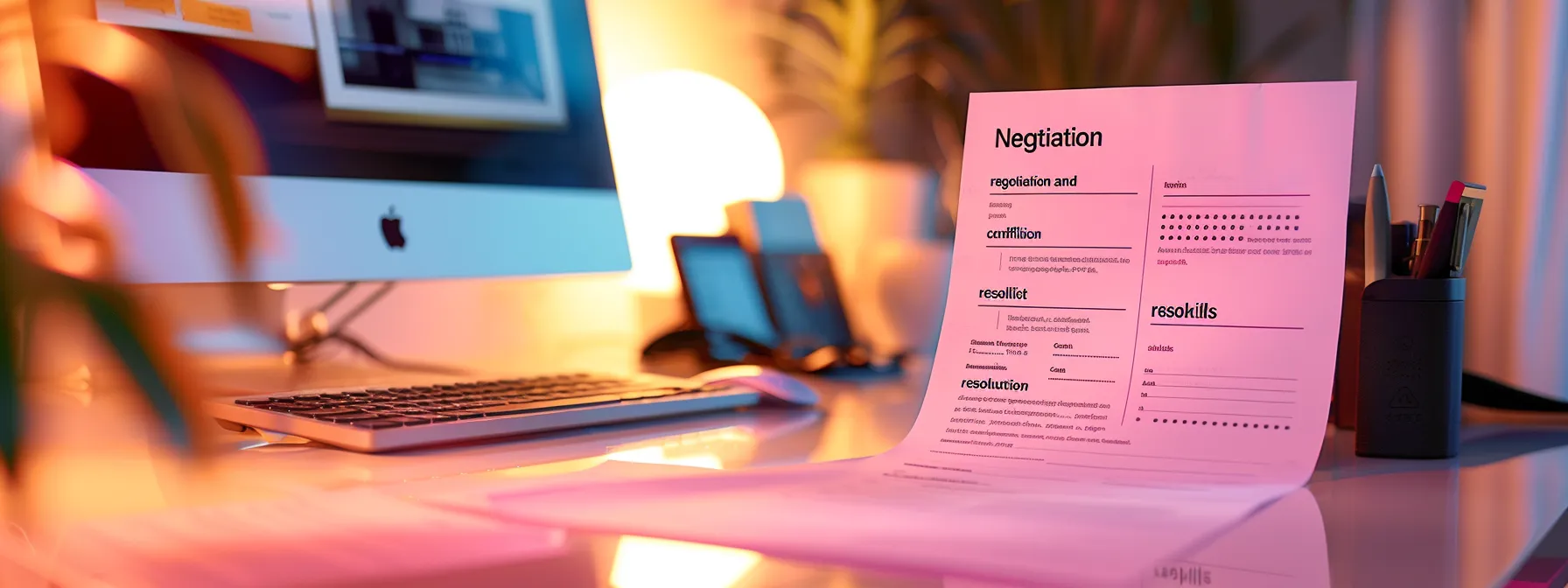Disclaimer: We sometimes use affiliate links in our content. For more information, visit our Disclaimer Page.
Are you struggling to highlight your negotiation and conflict resolution skills on your resume? Many candidates overlook these crucial abilities, even though they play a significant role in effective dialogue and successful arbitration. In this article, you’ll learn how to identify your key skills, showcase them in your professional summary, and weave them into your work experience. By the end, you’ll understand how to enhance your personal branding and make a lasting impact, addressing potential concerns that employers may have about your behavior in challenging situations.
Understanding the Importance of Negotiation and Conflict Resolution Skills

Understanding negotiation and conflict resolution skills is essential for your professional success. These leadership experience examples for resume skills foster better workplace relationships and improve overall communication. Additionally, they are in high demand across various industries, making awareness of their value critical for any expert aiming to stand out. The following topics will explore their roles and benefits in more detail.
Recognizing Their Role in Professional Success
Negotiation and conflict resolution skills are vital in promoting your professional success, especially in high-stakes environments like the law. When you can effectively manage conflict, you demonstrate not only your ability to maintain a positive work atmosphere but also your commitment to collaboration. Employers value candidates who approach challenges with creativity and empathy, as these traits lead to better problem-solving and improved team dynamics.
By incorporating these skills into your resume, you highlight your capability to navigate workplace disputes while fostering strong relationships. Think about specific situations where you successfully resolved a conflict or negotiated a solution. Crafting those experiences clearly shows your understanding of conflict management and emphasizes your effectiveness in various professional scenarios. This not only enhances your candidacy but also reassures potential employers of your proactive approach.
How These Skills Enhance Workplace Relationships
Negotiation and conflict resolution skills play a significant role in enhancing workplace relationships. When you engage in active listening, you demonstrate genuine attention to others’ perspectives, which fosters trust among your colleagues. This trust not only leads to stronger bond but also encourages innovation within teams, as everyone feels valued and included in the decision-making process.
Moreover, effectively handling disputes can lead to reduced turnover rates, saving organizations both time and resources. Evidence shows that employees who feel heard and respected are more likely to stay and contribute positively to their workplace. By showcasing your negotiation and conflict resolution abilities on your resume, you highlight your commitment to maintaining a harmonious work environment that promotes collaboration and overall success.
The Demand for These Skills in Various Industries
The demand for negotiation and conflict resolution skills spans across various industries, highlighting their critical role in fostering effective workplace dynamics. Employers value these abilities as they are directly linked to employee retention and overall team success. For example, in sectors such as healthcare or customer service, the ability to resolve conflicts with confidence and compassion can significantly impact both employee satisfaction and patient or client experience.
You now see why negotiation and conflict resolution matter. Next, let’s uncover what makes you effective in these skills.
Identifying Your Key Negotiation and Conflict Resolution Abilities

To effectively showcase your negotiation and conflict resolution abilities on your resume, start by assessing your strengths and experiences. Identify common scenarios where you’ve applied these skills, whether in policy discussions or organization tasks. Additionally, reflecting on feedback from colleagues or performance reviews can provide valuable insights into your effectiveness. Each of these elements contributes greatly to your appeal during a job interview.
Assessing Your Strengths and Experiences
To effectively assess your strengths and experiences in negotiation and conflict resolution, consider your previous roles in human resources or customer service. Think about times when you successfully managed disagreements or facilitated cooperation between team members. Reflecting on how you addressed anger or frustration can help you identify key moments where your skills made a significant impact in creating a positive environment.
Gather feedback from colleagues and supervisors to gain a deeper understanding of your capabilities. Their insights can reveal patterns in how you handle challenging situations, especially in industries dealing with customs or compliance issues. This self-assessment will not only enhance your resume but also prepare you for discussing these valuable skills during job interviews, showcasing your ability to navigate complex interactions with confidence.
Common Scenarios Where You’ve Applied These Skills
In many roles, you have likely faced conflicts that required effective negotiation and emotional intelligence. For instance, during a research project, you may have collaborated with team members who had diverging opinions on strategy. By facilitating open discussions and acknowledging varying perspectives, you not only reduced risk but also promoted a cooperative environment where everyone’s input was valued.
Additionally, think about situations in previous employment where you successfully mediated disagreements between colleagues. Your ability to listen actively and empathize with differing viewpoints worked to de-escalate tensions, leading to constructive solutions. Highlighting these experiences on your resume shows potential employers that you possess the negotiation and conflict resolution skills necessary to foster teamwork and drive project success.
Reflecting on Feedback and Performance Reviews
Reflecting on feedback from colleagues and performance reviews can provide valuable insights into your negotiation and conflict resolution abilities. Consider moments where your emotional intelligence shone through, especially in resolving team disputes or addressing misunderstandings. By recognizing patterns in how you handle conflicts, you can identify strengths such as your problem-solving skills and your ability to maintain confidentiality during sensitive discussions, enhancing your overall effectiveness.
Additionally, analyzing feedback can help you understand how your approach impacts others in the workplace. If colleagues expressed feelings of resentment due to unresolved conflicts, this is a clear indicator that you may need to refine your alternative dispute resolution techniques. Using this insight, you can work on strategies to improve your negotiation skills, positioning yourself as a more effective team player and leader in high-pressure situations.
Knowing your strengths in negotiation and conflict resolution is just the beginning. Now, let’s turn those skills into powerful statements in your professional summary.
Highlighting Skills in Your Professional Summary

Crafting a compelling summary statement is essential for showcasing your dispute resolution skills effectively. You’ll want to emphasize your unique skill set while aligning your summary with the job description to capture the attention of potential employers during an interview. Each of these elements highlights your knowledge in managing conflicts, particularly in high-stakes situations like lawsuits, providing a clear value to your application.
Crafting a Compelling Summary Statement
When crafting a compelling summary statement, focus on how your negotiation and conflict resolution skills serve as verbs that drive action in emergency management situations. Highlight specific instances where you successfully fostered compromise during tense discussions. By emphasizing your motivation to achieve positive outcomes, you position yourself as a proactive candidate who enhances workplace efficiency and morale.
Integrate emotions into your summary statement by demonstrating your ability to navigate difficult interactions with empathy and understanding. Share examples that illustrate how your skills have led to successful conflict resolution, showcasing your capacity to unite teams through effective communication. This approach not only strengthens your resume but also reflects your commitment to maintaining a harmonious work environment, elevating your appeal to potential employers.
Emphasizing Your Unique Skill Set
When you emphasize your unique skill set in your professional summary, highlight your leadership abilities that enable you to navigate difficult conversations and foster teamwork. Articulating how your social skills help you identify and implement the best alternative to a negotiated agreement not only showcases your expertise but also builds trust with potential employers. This approach effectively communicates your value proposition as someone who can lead teams through conflicts toward successful resolutions.
Use specific examples to illustrate your negotiation skills in past roles, emphasizing situations where you turned conflicts into opportunities for collaboration. This not only reflects your problem-solving capabilities but also addresses a key concern for employers seeking candidates who promote a positive work environment. By tying your unique skills to the needs of the organization, you reinforce your candidacy as a professional who adds tangible value to the team.
Aligning Your Summary With the Job Description
Aligning your summary with the job description is essential for showcasing your negotiation and conflict resolution skills effectively. By emphasizing keywords that the employer uses, such as “teamwork,” “strategy,” and “ethics,” you create a direct connection between your capabilities and the organization’s goals. This strategy demonstrates that you not only understand the role but also possess the necessary skills to contribute positively within their framework.
Additionally, tailor your summary to reflect the specific requirements of the position, reinforcing how your background fits into their curriculum or operational agency. Mentioning past experiences where you successfully managed conflicts or facilitated teamwork will resonate with hiring managers. This targeted approach highlights your understanding of their needs, making your resume more impactful and increasing your chances of standing out in the selection process.
You’ve laid out your skills clearly. Now, let’s explore how to weave them into your work history for a stronger impact.
Showcasing Skills in Work Experience

When showcasing your negotiation and conflict resolution skills in your work experience, focus on writing impactful bullet points that highlight your contributions. Use action verbs to demonstrate your expertise in crisis management and mediation. Quantify your achievements to show outcomes, and illustrate success with specific examples from training and development or contract negotiations. These elements will enhance your resume’s relevance and value.
Writing Impactful Bullet Points
Writing impactful bullet points is essential for demonstrating your negotiation and conflict resolution skills effectively. Focus on using strong action verbs that clearly convey your contributions, such as “facilitated,” “mediated,” or “negotiated.” This active language captures attention and gives potential employers a concrete understanding of your role in training others and leading initiatives, providing compelling leadership experience examples for your resume.
Be sure to quantify your achievements when possible, as this adds credibility to your claims. For instance, you might say that you “reduced conflict resolution time by 30% through tailored training sessions,” which highlights your training skills and underscores your ability to produce measurable results. These detailed bullet points not only showcase your capabilities but also align with the needs of employers looking for candidates who can navigate complex workplace conflicts efficiently.
Using Action Verbs to Demonstrate Expertise
Incorporating strong action verbs into your resume is essential for clearly demonstrating your negotiation and conflict resolution skills. Words like “negotiated,” “mediated,” and “facilitated” not only illustrate your role in resolving disputes but also convey a sense of initiative and authority. For instance, stating that you “mediated a successful resolution between two departments, leading to a 25% increase in project efficiency” highlights your ability to drive positive outcomes and adds measurable impact to your experience.
Using action verbs effectively allows you to create a compelling narrative around your expertise. When you frame your accomplishments with dynamic language, you engage potential employers and emphasize your proactive nature in managing conflicts. For example, if you describe how you “negotiated contracts that saved the company 15% in costs,” it showcases both your negotiation skills and your contribution to the organization’s bottom line. This approach not only enhances your resume but also positions you as a candidate capable of making valuable contributions in any role.
Quantifying Achievements and Outcomes
Quantifying your achievements in negotiation and conflict resolution significantly enhances your resume’s impact. Instead of simply stating your role in resolving disputes, provide specific metrics that highlight your contributions. For instance, if you mediated a conflict that ultimately improved team collaboration, you might say you “increased project efficiency by 25%.” Such details not only demonstrate your effectiveness but also show potential employers how you can add value to their organization.
When you quantify outcomes from your negotiation and conflict resolution efforts, you create a clearer picture of your capabilities. Highlighting statistics, such as “reduced project delays by 15% through effective conflict management,” offers tangible evidence of your skills in action. This approach not only builds your credibility but also addresses hiring managers’ needs for candidates who can produce measurable results in high-pressure situations.
Illustrating Success With Specific Examples
To effectively illustrate your success in negotiation and conflict resolution, include specific examples that demonstrate your abilities in real-world situations. For instance, if you led a team project facing disagreements on direction, describe how you facilitated discussions that brought about a consensus. This not only highlights your mediation skills but also shows how your approach resulted in improved collaboration and project outcomes.
Another valuable tactic is to quantify your achievements when possible. For example, if you resolved a customer conflict that directly increased customer satisfaction scores, mention the percentage improvement achieved. By providing these concrete examples, you reinforce the impact of your negotiation skills and conflict resolution abilities, making your resume stand out to potential employers eager for results-driven candidates.
Having learned to showcase your skills through experience, it’s time to gather them in a focused section. This next step can highlight what makes you unique and grab the attention of those who read it.
Incorporating Skills Into a Dedicated Skills Section

To effectively showcase your negotiation and conflict resolution skills, start by selecting relevant keywords that align with the job requirements. Organizing these skills for clarity improves readability for hiring managers. Additionally, striking a balance between technical and soft skills ensures you present a comprehensive view of your capabilities. Together, these strategies create a compelling skills section that enhances your resume’s impact.
Selecting Relevant Keywords
Selecting relevant keywords for your resume is crucial to demonstrating your negotiation and conflict resolution skills effectively. Start by analyzing job descriptions in your field to identify commonly used terms, such as “negotiation,” “dispute resolution,” and “collaboration.” By incorporating these keywords in your dedicated skills section, you help your resume get noticed by hiring managers and automated applicant tracking systems, which scan for specific phrases related to the job requirements.
As you select keywords, ensure they reflect not only your skills but also the context in which you’ve applied them. For instance, terms like “active listening” or “mediating conflicts” indicate a direct connection to your past experiences. This tailored approach highlights your strengths and aligns your background with the needs of potential employers, reinforcing your candidacy as a strong fit for the roles you’re targeting.
Organizing Skills for Readability
To improve readability in your skills section, categorize your negotiation and conflict resolution abilities into clear subtopics. For example, group skills such as “Active Listening,” “Mediation,” and “Collaborative Problem Solving” together. This organization makes it easier for hiring managers to quickly find relevant qualifications that align with their needs, increasing the chances of your resume standing out.
Using bullet points to present these organized skills further enhances clarity. By listing each skill alongside a brief explanation of how you’ve applied it in past roles, you demonstrate practical experience. This approach provides potential employers with a clearer picture of your capabilities and assures them that you can effectively contribute to their team in negotiation and conflict resolution scenarios.
Balancing Technical and Soft Skills
Balancing technical and soft skills is crucial for presenting a well-rounded profile in your resume. Technical skills, such as negotiation techniques or conflict analysis, demonstrate your expertise and proficiency in these areas, while soft skills like empathy and active listening highlight your personal approach to handling disputes. Employers often seek candidates who can combine both, as this balance increases the likelihood of achieving effective resolutions and maintaining team harmony.
When showcasing your negotiation and conflict resolution skills, ensure you communicate this balance clearly. For instance, you might describe how your ability to analyze complex situations (a technical skill) complemented your capacity for engaging with team members empathetically (a soft skill). This approach not only emphasizes your comprehensive skill set but also assures potential employers of your capability to handle challenges effectively in a collaborative environment.
Identifying your skills is just the beginning. Next, you must prepare for the questions employers will ask to test those skills.
Preparing for Potential Employer Questions

In preparing for interviews, anticipate questions about conflict resolution and negotiation scenarios. You’ll need to prepare specific examples for behavioral interviews that highlight your skills effectively. Additionally, showcasing your commitment to continued growth and learning in these areas will demonstrate your readiness to contribute to any team. This section will guide you on addressing these key points confidently.
Anticipating Questions About Conflict Resolution
When preparing for interviews, anticipate questions about how you’ve handled conflict resolution in the past. Employers often seek specific examples to gauge your ability to manage disagreements effectively and maintain team harmony. To create a strong response, think of a situation where you diplomatically resolved a conflict and focus on the steps you took to achieve a positive outcome.
Consider framing your answers using the STAR method—Situation, Task, Action, and Result. This technique allows you to illustrate your negotiation and conflict resolution skills clearly. By detailing the context and the actions you implemented, you provide insight into your approach and problem-solving abilities, reassuring employers that you can handle potential workplace challenges with confidence.
Preparing Examples for Behavioral Interviews
When preparing for behavioral interviews, reflecting on past experiences where you successfully navigated negotiation and conflict resolution is crucial. Think about specific situations that showcase your ability to manage disagreements effectively. By utilizing the STAR method—articulating the Situation, Task, Action, and Result—you can present a compelling story that highlights your skills and proves your potential value to the organization.
It’s beneficial to focus on scenarios that demonstrate your emotional intelligence and problem-solving capabilities, particularly in high-stakes situations. Describe how you approached conflict with empathy and communication, leading to positive outcomes. This method not only illustrates your negotiation abilities but also reassures employers that you are equipped to handle future challenges with professionalism and confidence.
Demonstrating Continued Growth and Learning
Demonstrating your commitment to continued growth and learning in negotiation and conflict resolution can set you apart during interviews. Employers appreciate candidates who actively seek opportunities to enhance these skills, whether through formal training, workshops, or self-study. Share specific examples of courses you’ve taken or seminars you’ve attended, emphasizing how these experiences have improved your ability to manage conflicts creatively and empathetically.
Additionally, discussing your efforts to seek feedback and implement changes based on constructive criticism shows a willingness to grow. For instance, if you adjusted your approach after receiving input from peers about your conflict resolution techniques, highlight this as an example of your adaptability. This narrative not only demonstrates your proactive nature but also assures potential employers that you are committed to refining your negotiation and conflict resolution skills over time.
Conclusion
Mastering the ability to showcase your negotiation and conflict resolution skills on your resume significantly enhances your professional appeal. By highlighting specific experiences and quantifying achievements, you demonstrate your competence in handling workplace challenges effectively. Employers value candidates who can foster collaboration and maintain harmony within teams, making these skills indispensable across various industries. Ultimately, emphasizing these abilities not only sets you apart in a competitive job market but also aligns with the needs of organizations seeking proactive problem solvers.





